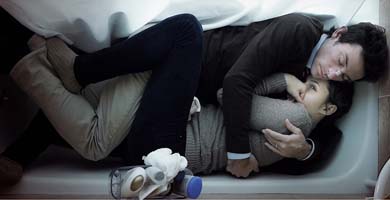
Filmmaker Shane Carruth also stars in his own film, Upstream Color, with Amy Steimetz.
One of the most widely discussed and debated films among cineastes and critics this year is an exciting work you may never have seen, or even heard of. Artfully and appropriately titled Upstream Color, the film was the talk of the 2013 Sundance Film Festival where, after its screening, tweeters went wild.
This is a cinematic exercise with double-edged appeal—especially for those who favor science fiction and experimental film techniques. Upstream Color is the second screen feature by 41-year-old Shane Carruth, a college graduate with a degree in mathematics. Carruth worked as a software engineer before gaining acclaim in 2004 as the writer-director of Primer. He made that sci-fi drama for less than $10,000, and received high praise for his sophisticated, complex treatment of scientific enterprise. Primer took the coveted Grand Jury Prize at Sundance that year.
Upstream Color shares many similar qualities with Primer, notably in the emphasis on scientific content. But a big difference in Carruth’s second feature is the remarkable level of production artistry and technical achievement—a singular triumph because he wrote, directed, and edited the picture; he also composed the musical score and played one of the two principal roles in the film.
Trust the experience
I will argue upfront that, in my opinion, Upstream Color’s 95 minutes of screen time are best approached as a cinematic experience that deliberately avoids a well-made narrative construction. Do not expect an easily understood storyline. Carruth likes to rattle the viewer’s expectations, and this is a film that asks—demands really—to simply be seen and absorbed. It can be sorted out later. This is an experience of fragments, discontinuous dialogue, action montages, and abrupt time changes. Daily realities intermingle with mental apparitions and abstract imagery.
So, what is the filmgoer given as concrete substance? In a nutshell the brilliant experimental maneuvering centers on an attractive young man and woman, Jeff (Shane Carruth) and Kris (Amy Steimetz), who are “sampled” targets of parasitic engineering and who, after becoming a couple, struggle to cope with the mental and psychological disarray of their lives—separately and together. A complex range of emotions surfaces: anxiety, confusion, fear, mutual concern, and a dissonant anger that encroaches on their relationship. For Jeff and Kris the challenge to survive as a couple is mystifyingly enormous, and it is in that struggle that Carruth’s film achieves a connection with the viewer.
Among the film’s other vaguely drawn, not-fully-explained central characters are “the thief” (Thiago Martins), who preys upon Kris, and a strange, silent figure (Andrew Sensenig), who leads a double life as a pig farmer and a recordist for a company that manufactures expressive sound-generated CDs.
A feast for the senses
Important to Upstream Color’s overall impact is Carruth’s masterful display of cinematic technique. In addition to its virtuoso editing, the film is a glorious feast for the eyes. Not since Michael Mann’s Public Enemies (2009) have I seen a film in which lighting and color are used so vividly to evoke mood and highlight dramatic situations. Variously, scenes are set in chiaroscuro light-and-shadow schemes, in soft sepia tones, in bold clinical blues and whites, in distancing pastels, and in the lush colors of nature. Film colorist Toby Halbrooks enhances natural exteriors with objects—leaves, flowers, plants—that appear to be painted with a brush for a fantasy-like effect. Carruth’s musical scoring, sometimes symphonic, sometimes electronic, evokes and underscores the ever-changing tensions that permeate the film. An ingenious abstract soundtrack, often embedded in the musical score, earned Sundance’s Grand Jury Sound Design Award.
All in all, the complexities of Upstream Color and its innovative cinematic techniques add up to a fascinating and haunting film experience—one that cannot (and should not) be fully described on paper.
One can think of other similarly challenging films that are fascinating and engaging because of their artful inexplicitness. A number come to mind: Maya Deren’s Meshes of the Afternoon (1943); Robert Altman’s 3 Women (1977); Terrence Malick’s Days of Heaven (1978) and The Tree of Life (2011): and the Wachowskis’ Cloud Atlas (2012). All are films that, like Upstream Color, merit more than a single viewing. I’ve now watched Carruth’s film three times.
One historical note: There have been other notable film directors who, like Shane Carruth, came to film with engineering and mathematical backgrounds. The Russian creator of dialectical montage editing Sergei Eisenstein studied architecture and engineering at the Petrograd Institute of Civil Engineering. America’s great populist director Frank Capra received a civil engineering degree in 1918 from the California Institute of Technology, and later taught math classes while in the U.S. Army at Fort Scott, Calif. Are there other engineer-trained filmmakers out there? I would imagine so.
Do you have a favorite film that is “fascinating and engaging because of its artful inexplicitness?”



whILXonGdql FqUtzm0H - uHCJs3GrlKrl
Off top of my head here are some high concept films Being John MalkovitchCold SoulsBlade RunnerName of the RoseAlice in Wonderland (these last 3 are ltriraey adaptations, so not sure if that means they are not really films as concepts)ArmageddonCube (that film about a maze/killing machine)Rollerball, Death Race 2000 there are lots of action films with unusual concepts’.Practically anything with time travel in it.My 2c!
Reply
Deborah Holdship
I will be in touch. Thanks so much. Sounds like quite an adventure! Deborah Holdship
Reply
whILXonGdql FqUtzm0H
Off top of my head here are some high concept films: Being John Malkovich, Cold Souls, Blade Runner, Name of the Rose, Alice in Wonderland (these last 3 are literary adaptations, so not sure if that means they are not really films as concepts). Also, Armageddon, Cube (that film about a maze/killing machine), Rollerball, Death Race 2000 … There are lots of action films with unusual concepts. Practically anything with time travel in it. My 2 cents!
Reply